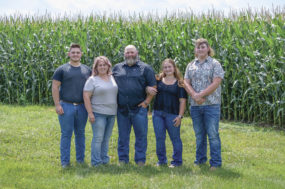ElRoy Haadem recently began boxing up 43 years of memories from his office, his total tenure with the North Dakota State University Extension Service. Thirty-five have been spent at the Burleigh County branch in Bismarck, North Dakota. “The strength of the extension is you always get to interact with people,” he said. Haadem, 69, said his biggest role as an agent was that of educator in agriculture, community, family science and youth programs. He cautions it’s not an 8 to 5 job, and one that can mean 60-hour weeks with a lot of evening and weekend work. Yet he calls it a very satisfying experience. He said there is no typical day. “You’re able to provide education, information. ... If I wouldn’t have enjoyed it, I wouldn’t have done it as long as I did.”
His interest in the Extension service was seeded growing up in rural Tappen. He earned a degree in agriculture from NDSU in Fargo before serving as a helicopter pilot for the Army in Vietnam. He was a rescue helicopter pilot in Georgia when offered the first Extension job in the Williams County in Williston. He was the Foster County Extension agent in Carrington nine years before coming here. He later earned a master’s degree in public administration from the University of North Dakota in Grand Forks. Until eight years ago, Haadem served as a helicopter pilot for the National Guard for 30 years.
The biggest changes Haadem has seen in agriculture is how producers specialize for bigger profits, have later harvests with diversified crops, and the emergence of lentils, peas, beans and sunflowers as regular crops. He also believes the commodity prices are stronger than a few decades past because producers are more involved with marketing. Yet, the better profits also met with the steeper costs of machinery and fertilizer.
“Livestock has also changed,” he said. “It used to be everybody had hogs, everybody had beef, everybody had poultry, everybody had dairy. In this county, there are virtually no hogs. The hog operations have gone to these extremely large operations.” He said livestock producers have gone to more minimized crops and genetic-modified crops are a tool to fight off weeds and insects. Producers idle their property less.
“He is leaving the system with a wealth of knowledge. He is very supportive of farmers’ and ranchers’ interests in trying new technology to keep their operations profitable,” said Gerald Sturn, southwest district director of North Dakota State University. Sturn said Haadem is very connected to agriculture and committed to working with farmers, ranchers and ag producers about their crops and livestock systems.
He said Haadem’s strength also lies in being able to work with a variety of people.
“He has a big of love of the 4-H program. He is very helpful in getting youth active in ag programs and supports them,” Sturn said.
Haadem said he plans on finding some kind of part-time work. “I’m not good at sitting around.” He and his wife Carol have three grown children and three grandchildren.
His final day was officially July 15, but his retirement open house is coming up.
KaSondra Staiger of Bismarck has been hired to replace Haadem on Aug. 1. Staiger is a graduate of NDSU with degrees in animal science and equine studies. She has been an intern with the center for 4-H, and works for the U.S. Army Corps of Engineers.
She has been active Mercer County 4-H member for many years and was actively involve with the NDSU Extension Service while attending college at NDSU. She was part of the NDSU Livestock Judging Team for livestock and horses, was actively involved with the NDSU Saddle and Sirloin Club, belonged to NDSU PAS/C.FFA, and was a NDSU Agricultural Ambassador. She is a certified 4-H horse judge. PD
—From Bismarck Tribune



